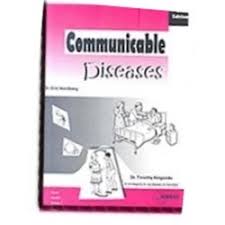This manual covers the full range of communicable diseases in the African region: skin infections, malaria and other vector-borne diseases.
communicable diseases
KSh 3,000.00
This manual covers the full range of communicable diseases in the African region: skin infections, malaria and other vector-borne diseases.
5 in stock
Related products
-
The Behavioral Health Specialist in Primary Care: Skills for Integrated Practice
KSh 12,600.00Patients with chronic conditions often need psychosocial support and brief counseling to help them make the lifestyle and behavioral changes required to prevent disease complications. This innovative text, with contributions from respected clinicians and researchers in all arenas of behavioral health, provides comprehensive training for all health professionalsóincluding those in medicine, nursing, social work, mental health, and clinical and health psychologyówho desire targeted evidence-based training in behavioral health skills. Rich case examples drawn from typical patient presentations demonstrate the relationship between physical and psychological health and the complexity of behavioral change in chronic illness.
This text is a timely, relevant, and practical resource for all members of the primary care team. It prepares team members to work in the model of patient-centered integrated care in accordance with the recommendations of the Affordable Care Act (ACA) and the National Committee for Quality Assurance (NCQA) medical home standards for identifying patient needs and providing coordinated and comprehensive patient care. The book focuses on knowledge and skills needed for working with the most common chronic conditions such as diabetes, obesity, chronic pain, cardiovascular conditions, sleep disorders, geriatric conditions, cancer-related conditions, and substance abuse. It includes chapters on epidemiological trends in chronic illness and systems medicine. Theories of health behavior and behavioral change and evidence-based interventions provide a foundation for skill development, followed by detailed coverage of the requirements for behavioral management of specific chronic conditions. Sample referrals and consultation notes provide concrete examples of how the behavioral health specialist might respond to a referral.
KEY FEATURES:
- Provides comprehensive graduate-level training for the role of Behavioral Health Specialist
- Describes the health promotion and counseling skills needed to function as part of an integrated health team
- Focuses on proficiencies needed for working with common chronic conditions
- Addresses the psychosocial components of primary care disorders
- Includes case examples demonstrating the relationship between physical and psychological health and the complexity of behavioral change in chronic illness
-
Community-Based Participatory Research for Health: Advancing Social and Health Equity 3rd Edition
KSh 7,840.00The definitive guide to CBPR concepts and practice, updated and expanded
Community-Based Participatory Research for Health: Advancing Health and Social Equity provides a comprehensive reference for this rapidly growing field in participatory and community-engaged research. Hailed as effective by the Centers for Disease Control and Prevention, CBPR and CEnR represent the link between researchers and community and lead to improved public health outcomes.
-
Introduction to Information Systems for Health Information Technology, Fourth Edition
This comprehensive textbook introduces students to the essential role of information systems in today’s healthcare environment. The Fourth Edition of Introduction to Information Systems for Health Information Technology provides a clear, accessible overview of healthcare IT systems, data management, and the critical importance of health information technology (HIT) in delivering safe, efficient, and high-quality patient care.
Aligned with current CAHIIM and AHIMA curriculum competencies, the book prepares students for careers in health information management (HIM) by exploring real-world applications of EHRs (electronic health records), interoperability, data governance, privacy and security, system implementation, and analytics.
Filled with up-to-date examples, key terms, review questions, and engaging visuals, this edition is ideal for HIT and HIM students preparing for certification and clinical practice in a technology-driven healthcare world.
-
Molecular diagnostics: Fundamentals, Methods, and Clinical Applications
KSh 8,680.00Molecular diagnostics continues to grow in importance in the clinical laboratory. This respected text will prepare your students with a grounding in the fundamental principles of molecular biology. current methods, and their clinical applications.
With a focus on the application of molecular concepts to diagnostic purposes, the text explains and illustrate the use and interpretation of molecular-based assays in patient care. Now with an expanded discussion of nucleic acid sequencing, with added emphasis on next generation sequencing (NGS), and updated coverage of proteomics and mass spectrometry applications, your students will have the most current information available today.
-
Ross and Wilson;Anatomy and Physiology in Health and Illness. International Edition, 14th Edition
KSh 8,000.00Now in its fourteenth edition, this best-selling textbook has been honed over many years to provide a clear, straightforward introduction to the human body for students of nursing, allied health or biomedical and paramedical science.
The book covers the core essentials of anatomy and physiology, including basic pathology and pathophysiology of important diseases and disorders. This new edition presents additional illustrations to enhance understanding of key concepts, including pathophysiology and diagnostics. Included for the first time is an introduction to surface anatomy, while other updating reflects current scientific knowledge and developments, including coronavirus. Enhanced learning features and an extensive online resource help you grasp all the important areas.
Like millions of readers before you, you will treasure Ross & Wilson as a go-to resource that you will refer to time and again to support this critical aspect of your healthcare education.
Key Features-
- Clear and easy to read – suitable for students new to the area and anyone whose first language is not English
-
- Hundreds of stunning illustrations and images to make learning easy
-
- Helpful learning features such as Learning Outcomes boxes, colour coding and orientation icons to facilitate navigation
-
- Definitions of common prefixes, suffixes and roots, examples, glossary and an appendix of normal biological values
-
- Self-assessment activities in each chapter, including ‘spot check’ questions for each section and case studies with answers to develop understanding of key principles
- Accompanying website with animations, videos, audio-glossary and other self-assessment material
Evolve Study Resources
Online content offered with Ross & Wilson Anatomy and Physiology in Health and Illness 14th edition includes:
-
- New for this edition – a set of expert-narrated 3D videos summarizing key topics in the book, powered by Complete Anatomy: the world’s most advanced 3D anatomy platform
-
- Over 120 animations clarifying underlying principles and make learning fun
-
- More than 1700 audio glossary entries
-
- Body Spectrum © online colouring and self-test software
- Self-assessment questions to help students test their knowledge
Author InformationBy Anne Waugh, MSc CertEd SRN RNT FHEA, School of Acute and Continuing care Nursing, Napier University, Edinburgh, UK and Allison Grant, BSc PhD RGN, Department of Biological and Biomedical Sciences, Glasgow Caledonian University, Glasgow, UK -
-
The Global Family Planning Revolution: Three Decades of Population Policies and Programs (Moving Out of Poverty) Paperback
KSh 7,000.00The striking upsurge in population growth rates in developing countries at the close of World War II gained force during the next decade. From the 1950s to the 1970s, scholars and advocacy groups publicized the trend and drew troubling conclusions about its economic and ecological implications. Private educational and philanthropic organizations, government, and international organizations joined in the struggle to reduce fertility. Three decades later this movement has seen changes beyond anyone’s most optimistic dreams, and global demographic stabilization is expected in this century.
‘The Global Family Planning Revolution’ preserves the remarkable record of this success. Its editors and authors offer more than a historical record. They disccuss important lessons for current and future initiatives of the international community. Some programs succeeded while others initially failed, and the analyses provide valuable guidance for emerging health-related policy objectives and responses to global challenges.
-
Kumar and Clark’s Clinical Medicine
KSh 17,470.00Now in its tenth edition, Kumar & Clark’s Clinical Medicine is fully updated and revised under a new team of editors.
Featuring new chapters covering:
o Diagnosis: the art of being a doctor – helping readers to develop a confident clinical method in interactions with patients
o Elderly medicine, frailty and multimorbidity
o Public health
o Surgery
o Evidence-based medicine
o Sepsis and the treatment of bacterial infection
o Haematological Oncology
o Venous thromboembolic disease
o Hypertension
o Men’s health
Enhanced clinical skills content has been added to most chapters – helping readers tailor history-taking and examination skills to specific specialty-based contexts.
Bonus online content – including self-assessment, common clinical and international cases, cardiovascular and respiratory audio material, clinical examination videos and bite-sized topic pages covering major conditions.
Heavily revised throughout with smaller chapters to ease navigation, added introductions and system overviews included for most chapters.Edited by Adam Feather, MBBS, FRCP, FAcadMEd; David Randall, MA, MRCP; and Mona Waterhouse, MA, MRCP. Contributors comprise consultants at the top of their fields, paired with younger doctors closer to the exam experience, to ensure authority and relevance. International Advisory Board, led by Professor Janaka de Silva and Professor Senaka Rajapakse, providing guidance for global coverage from across the world. Members of the International Advisory Board have contributed to the ebook with additional content to amplify areas of clinical importance in their parts of the world.Enhanced e-book accompanies the print book, for ease of transportation and use on the move.
Featuring new chapters covering:
o Diagnosis: the art of being a doctor – helping readers to develop a confident clinical method in interactions with patients
o Geriatric medicine, frailty and multimorbidity
o Public health
o Surgery
o Evidence-based medicine
o Sepsis
o Haematological Oncology
o Venous thromboembolic disease
o Hypertension
o Men’s health
o Obstetric medicine
Enhanced clinical skills content has been added to most chapters – helping readers tailor history-taking and examination skills to specific specialty-based contexts. -
The Brain That Changes Itself
KSh 1,095.00An astonishing new science called neuroplasticity is overthrowing the centuries-old notion that the human brain is immutable. Psychiatrist and psychoanalyst Norman Doidge, travelled around the US to meet both the brilliant scientists championing neuroplasticity and the people whose lives they’ve transformed – people whose mental limitations or brain damage were seen as unalterable. We see a woman born with half a brain that rewired itself to work as a whole, blind people who learn to see, learning disorders cured, IQs raised, aging brains rejuvenated, stroke patients learning to speak, children with cerebral palsy learning to move with more grace, depression and anxiety disorders successfully treated, and lifelong character traits changed. Using these marvellous stories to probe mysteries of the body, emotion, love, sex, culture, and education, Dr. Doidge has written an immensely moving, inspiring book that will permanently alter the way we look at our brains, human nature, and human potential.










Be the first to review “communicable diseases”